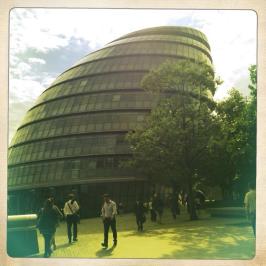Politics and Public Health
With the elections tomorrow (for MEPs, local councillors and/or local mayors – depending on where you live in England), the Public Health and Politics training event I attended yesterday in City Hall was timely and apt.
In contrast to the commonly theory-laden lectures of ‘how policies are made’ one is often subjected to when studying public health, the day started with Prof. Albert Weale and Prof. Peter Littlejohns’s enthusiastic dissection of the British political system with a particular focus on the Health And Social Care Act (2012).
How did the HASCA come to be?
Prof. Weale outlined that the development of the HASCA was in many ways atypical. Lansley had long expressed dissatisfaction with the status quo, and had set out his ideas for a considerable period of time before the 2010 elections, the main premise of which was the (apparent) need for a bottom-up reform. Whether one agrees that the policy development and implementation process was bottom-up rather than top-down, is a very different matter. Nonetheless… following the 2010 election results, the public health White Paper “Healthy Lives, Healthy People” was written very hurriedly and published very quickly in June 2010 – that it took quite some time for the key points to be digested which laid out the most fundamental changes to the NHS system since its inception in 1948.
As with all policy making, there will be a group who agree with the proposed change and a group against. And in simplest terms, it is the group with the largest number of supporters who shout the loudest who tend to decide whether the policy change is made. In regards to the HASCA, there was mounted opposition to the ideas laid out in the White Paper. So much so that a pause in the legislative process was created (which is very unusual) during which time the government conducted a ‘”listening exercise” on the proposed reform. Some amendments were made to the proposed policy following this exercise. However as the majority of MPs supporting the bill, the act was passed in 2012.
The HASCA has been in force for over 24 months now, and it is fair to say that the interpretation of the legislation is still an on-going and often difficult process. During the ‘why is your party good for health’ panel discussion all parties differed on their views regarding whether the HASCA was a good or bad move, yet all agreed that homing public health in local authorities is a great window of opportunity, and something they would not plan to change in the near future.
Where does public health stand on the political spectrum?
 All attendees participated in a poll of policy positions on health, and the results indicated (to no one’s surprise) that as a group of public health professionals we are predominantly left-wing and collectivist. Essentially, we believe that society should place prioritise health over the market, and that health is the responsibility of society at large (not just individuals).
All attendees participated in a poll of policy positions on health, and the results indicated (to no one’s surprise) that as a group of public health professionals we are predominantly left-wing and collectivist. Essentially, we believe that society should place prioritise health over the market, and that health is the responsibility of society at large (not just individuals).
Can public health be politically neutral?
My views have somewhat changed on this. Initially I believed that public health should always be politically neutral – we should avoid taking political stances and be guided by our evidence-base. However yesterday made me realise that as nothing is ever politically neutral, the best way to influence for the public health greater good is to be politically savvy.
What can we do?
There appears to be no way to predict what the winner of the 2015 General Election is likely to propose in terms of new policies affecting public health. Yet it would seem wise to a) identify pressure points / opportunities, and b) develop key messages ready to disperse once such opportunities arise.
One of the key messages of the day was that as a public health community we ought to engage more actively with the political system. Whether this is overt or covert, is likely to be down to individual choice. Prof. Littlejohns pointed out that one can do a lot of good by stealth. On the other hand, Luciana Berger (Shadow Secretary for Public Health) suggested that making noise about the issues you care about is important, and the lack of groundswell surrounding the cigarette plain packets policy may well be why this policy has lost its momentum of late…
But one thing is for sure: we can all vote. And tomorrow I will be doing exactly that, and hope you all do too.

Many thanks to the LKSS organising committee for such a brilliant event.

